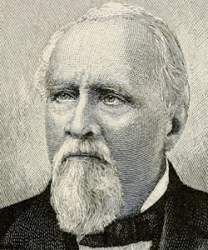Record Data
Source citation
Andrew Johnson, Paul Bergeron (ed), The Papers of Andrew Johnson: Volume 10, February-July 1866 (Knoxville, TN: University of Tennessee Press, 1992), 101.
Type
Letter
Date Certainty
Exact
Transcriber
John Osborne, Dickinson College
Transcription date
Transcription
The following text is presented here in complete form, as it originally appeared in print. Spelling and typographical errors have been preserved as in the original.
Executive Department
Milledgeville Georgia
February 15th 1866
Sir,
It has become my duty again to ask your attention to a subject adverted to in a former communication, viz: the keeping in our midst colored troops. After many of them had been withdrawn and the policy of their withdrawal seemed likely soon to be consumated, our people felt great relief, and in many localities where there remained no military force at all, law and order were strictly observed - peace and quiet prevailed - and good business relations, mutually advantageous, were established between white and colored people. Suddenly in certain places, as in the Cities of Macon and Columbus, colored troops were introduced, and settled as if for indefinite occupation. In the latter City, a most unfortunate disturbance of the public peace has already occurred, which from all the information in my possession, I verily believe originated in the grossly improper and insulting conduct of some of these troops. The circumstances are briely referred to, in the inclosed commmunication which is the immediate cause of this to you. A majority of the signers, are known to me personally or by reputation, as respectable, intelligent, moral men, such as any City or State might be proud of.
Their statements are altogether reliable. Believe me, Sir, the presence of these troops among us is unfavorable to the public peace and tranquility. When out of the immediate presence of their officers, their conduct is often intolerably insulting, and not unfrequently going to the extent of personal violence. I have myself, when quietly riding in my carriage with my Wife, on the high-way, in the absence of all provocation, by word by gesture or by look, been cursed by them and ordered to get out of the road with that carriege, they wanted the whole road. My old blood, did not boil over quite; but the hot blood of a young man can hardly bear being rudely thrust from the pavement, or seeing a lady wantonly insulted. If it be supposed that these troops are kept in proper subjection by their officers, I respectfully affirm that as a general rule, it is not so.
Mr President, I believe you have full authority in the premises, I know your kindly feelings and purposes towards us and I entreat you, if it do not contravene any policy you deem necessary, to relieve us of this portion of the United States Military.
Charles J. Jenkins
Governor of Geo
Images
Major Topics
People
Recipient



